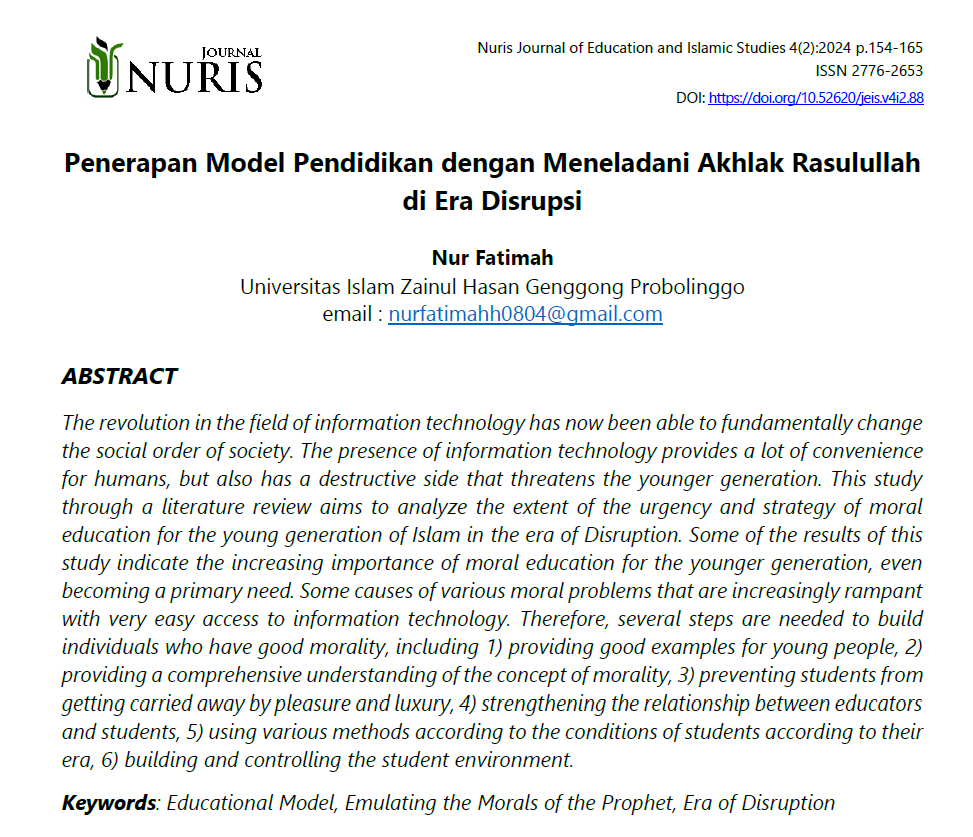Penerapan Model Pendidikan dengan Meneladani Akhlak Rasulullah di Era Disrupsi
Main Article Content
Abstract
The revolution in the field of information technology has now been able to fundamentally change the social order of society. The presence of information technology provides a lot of convenience for humans, but also has a destructive side that threatens the younger generation. This study through a literature review aims to analyze the extent of the urgency and strategy of moral education for the young generation of Islam in the era of Disruption. Some of the results of this study indicate the increasing importance of moral education for the younger generation, even becoming a primary need. Some causes of various moral problems that are increasingly rampant with very easy access to information technology. Therefore, several steps are needed to build individuals who have good morality, including 1) providing good examples for young people, 2) providing a comprehensive understanding of the concept of morality, 3) preventing students from getting carried away by pleasure and luxury, 4) strengthening the relationship between educators and students, 5) using various methods according to the conditions of students according to their era, 6) building and controlling the student environment.
Downloads
Metrics
Article Details

This work is licensed under a Creative Commons Attribution 4.0 International License.
License Terms
In submitting the manuscript to the journal, the authors certify that:
- They are authorized by their co-authors to enter into these arrangements.
- The work described has not been formally published before, except in the form of an abstract or as part of a published lecture, review, thesis, or overlay journal.
- That it is not under consideration for publication elsewhere,
- That its publication has been approved by all the author(s) and by the responsible authorities – tacitly or explicitly – of the institutes where the work has been carried out.
- They secure the right to reproduce any material that has already been published or copyrighted elsewhere.
- They agree to the following license and copyright agreement.
References
Abdurrahman Wahid. (2016). Universalisme Islam dan Toleransi . KALAM, 10(2).
Ali al-Jumbulani. (2013). Perbandinan Pendidikan Islam. Rineka Cipta.
Amir Said az-Zaibari. (2013). Manajemen Qalbu. Pustaka Pelajar.
Arief, A. (2005). Sejarah Pertumbuhan dan Perkembangan Lembaga Pendidikan Islam Klasik. Penerbit Angkasa.
Dyna Herlina S, Benni Setiawan, & Gilang Jiwana Adikara. (2018). Digital Parenting: Mendidik Anak Di Era Digital. Samudra Biru.
Fathoni, A. (2006). Metodologi Penelitian dan Teknik Penyusunan Skripsi. Rineka Cipta.
Hanafi, Y., Murtadho, N. M., Ikhsan, A., & Diyana, T. N. (2020). Reinforcing public university student’s worship education by developing and implementing mobile-learning management system in the ADDIE instructional design mode. International Journal of Interactive Mobile Technologies, 14(2), 215–241.
Husin, G. I. (2018). Pemikiran Tentang Sistem dan Kelembagaan Pendidikan Islam Di Masa Rasulullah Pada Periode Mekkah dan Periode Madinah. Jurnal Ilmiah Keagamaan Dan Kemasyarakatan.
Mulyasa. (2013). Pengembangan dan implementasi Kurikulum 2013 (Mulyasa, Ed.).
Rubini, R. (2019). Metode Pembelajaran Berbasis Hadis. Humanika, 18(1).
Srifariyati, S. (2020). Metode Pendidikan dalam Pandangan As-Sunnah. Madaniyah, 10(2).
Sugiyono. (2016). Memahami Penelitian Kualitatif. Alfabeta.
Yunahar Ilyas. (2018). Kuliah Akhlaq . LPPMI UMY.
Zulherma, Z., Tafiati, T., Sumiarti, S., & Wendry, N. (2021). Konsep Pendidikan Rasulullah dan Refleksi Kompetensi Holistik Sahabat. QALAMUNA: Jurnal Pendidikan, Sosial, Dan Agama, 13(2).

